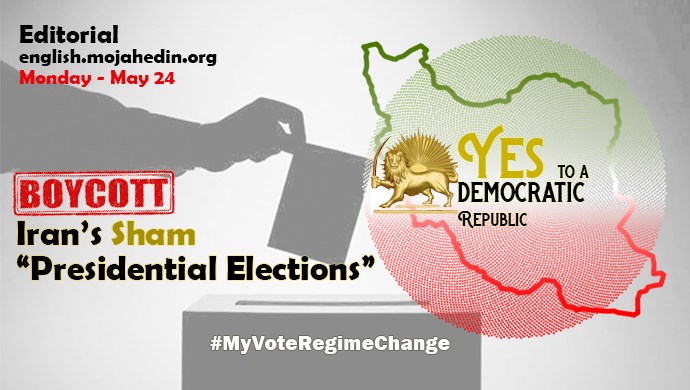This article is part of our coverage of the Iranian regime’s June 18 presidential elections
Iran, May 24, 2021—The Iranian regime’s Guardian Council will announce on Tuesday, May 25, the qualified candidates for the mullahs’ sham June 18 Presidential elections. The Guardian Council is the body that vets candidates, and those who add no value to the charade or harbor the slightest disagreement with the mullahs’ Supreme Leader Ali Khamenei are regularly disqualified.
Abbas Ali Kadkhodayi, spokesperson of the Guardian Council, announced earlier last week that only 40 of the 590 registered candidates have the necessary “qualifications.” Previously, the Guardian Council said in its statements that candidates should be among the regime’s religious and political leaders, have held official positions for at least four years, have a minimum of 40 years of age, and not be affiliated with any “illegal group” or having bad “security records.”
It is expected that Khamenei’s main candidates will be current judiciary chief Ebrahim Raisi and former Majlis (parliament) speaker Ali Larijani. Both have a long record in the regime’s crimes and plundering during the last 40 years. As indicated in an Associated Press report, Raisi is well-known for his role in the summer 1988 mass executions of over 30,000 political prisoners across Iran.
Therefore, he is one of the most hated figures and in his role as judiciary chief the regime’s repression and political executions have intensified, with the hanging of 27-year-old wrestling champion Navid Afkari being one such example.
The main obstacle before Khamenei and his regime is the high probability of a record low voter turnout in the mullahs’ sham elections.
“A low election turnout will lead to the loss of the concept of the Islamic Republic,” the state-run E’temad daily wrote on May 20, also warning of the threat of regime change and that a low election turnout can lead to anti-security events.
Iran’s state-run media also acknowledged that both regime currents agree on the fact that a low election turnout is the mullahs most important challenge during the June 18 presidential election façade.
“In the current circumstances based on polls and the experience of 2020 legislative elections, the society has no will to use its right to vote and this is a serious problem,” the state-run Sharq daily wrote on May 20.
Also on May 18, the state-run daily Jahan-e Sanat wrote, “In contrast to previous years there is no special enthusiasm in the society. The 2020 legislative elections showed that a low turnout has raised many concerns.”
According to the Iranian Students Polling Agency (ISPA) May reports, only 11.4 percent of the population are following up on news about the regime’s June 18 sham presidential elections and 38 percent of Iranians don’t even know the date of the election.
“As we speak, according to social experts, there is an atmosphere of depression and/or political dissatisfaction spread throughout the country,” the Jahan-e Sanat daily wrote.
However, Iran’s state-run media avoid the reality that in the last two and a half years the Iranian people have clearly rejected the clerical regime’s establishment in three major nationwide protests. Only in November 2019 protests, more than 1,500 innocent protesters were gunned down in the streets.
Therefore, talk of “elections” in Iran has no meaning for the people, as it never has in the past 42 years. As many Iranians today are protesting in various cities of Iran, “40 years of bloodshed is enough, we will not vote, we have heard so many lies, and our vote is regime change.”





